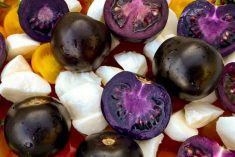In early March, scientists from Harvard University published a paper on butter versus seed oils.
They reached a clear finding: eating more butter can increase the risk of premature death by 15 per cent. People who consume higher levels of canola, soy and olive oil can reduce their risk of premature death by 16 per cent.
To a layperson, a 16 per cent lower risk of dying seems important and maybe something to ponder.
Read Also

Agriculture, including the pork sector, has monsters to slay in 2026
Tariffs, trade protectionism and disruption; Uncertainty is weighing against what should be positive signals for Manitoba’s pork sector.
However, this paper and the conclusion of scientists from Harvard will have zero impact on people who distrust seed oils, says a British nutritionist.
“Social media is currently awash with influencers promoting butter as a health food and claiming that seed oils are deadly,” said Sarah Berry of King’s College in London.
“In a sane world, this study would give the butter bros and anti-seed oil brigade pause for thought, but I’m confident that their brand of nutri-nonsense will continue unabated.”
There was a time when scientific reports from Harvard could sway public opinion, but no longer.
That “sane world” ended sometime between 2008 and 2020, thanks to social media and online influencers.
Many blame U.S. president Donald Trump for the erosion of truth and facts. In 2021, the Washington Post reported that Trump made 30,573 false and misleading claims over a period of four years.
Trump is part of the problem, but so is the political left.
Progressive elites are also guilty of spreading misinformation, especially on the topics of agriculture and food. One glaring example is the safety of genetically modified crops.
In 2016, a committee of experts from National Academies of Sciences, Engineering and Medicine in America published a massive report on GM crops. They looked at 900 research papers, heard from 80 speakers and held 15 public webinars.
Their conclusion? There is “no substantiated evidence” that GM crops are more risky than conventional crops.
This comprehensive report should have settled the issue. It did not.
The National Farmers Union, Greenpeace and the Council of Canadians are members of the Canadian Biotechnology Action Network (CBAN), which still questions the safety of GM crops.
“The potential risks from eating GM foods have not been fully investigated…. There is no scientific consensus on the safety of GM foods,” CBAN says.
This modern plague of misinformation, from the political left, right and everywhere in between, may only get worse.
Scientific truth is on a path to a premature death, just like people who eat five sticks of butter every week.
















